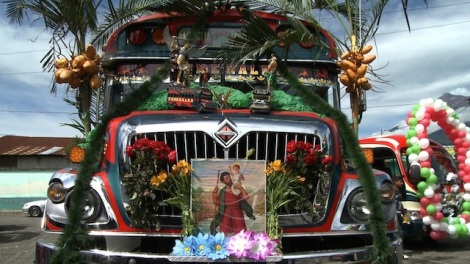One of the great gifts of cinema is its ability to transcend the social and cultural boundaries that too often prevent us from viewing the world through the eyes of others. Just as Rodrigo Reyes’ “Purgatorio” humanized the U.S.-Mexican border by centering its nonjudgmental lens on the human stories unfolding on both sides of the wall, so does Mark Kendall’s equally impressive, lyrical, almost dreamlike allegory, “La Camioneta.” Yet the majority of Kendall’s picture takes place in Guatemala’s Quetzal City, where American-bred migrants travel in pursuit of a revitalized life. In this case, the migrant is a public school bus.
In the grand tradition of achingly personal documentaries, the premise for “La Camioneta” (which translates to van or truck) was born in the most organic of ways. In an interview with Main Line news, Kendall recalls journeying through Central America on a bus that he learned was from a school district no less than 20 miles away from his Nashville residence. This realization inspired him to follow a single bus on its path from a field auction in Pennsylvania, through the treacherous highways of Mexico to its new home in Guatemala. In a brisk yet delicately paced 71 minutes, Kendall charts this journey without ever stumbling into tempting polemical waters.
Taking on the duties of cinematographer and editor, Kendall maintains an intimate yet unsentimental gaze on his interview subjects, which include the courageous Domingo Lastor, who earns his living by taking a 16-hour drive through Mexico every 15 days to transport newly purchased buses, and the charming Mario Enrique Valle, a specialist who lovingly transforms the faded yellow vehicles into vibrantly colorful art on wheels. The bus itself emerges as the film’s central character, as Kendall’s camera closes in to illuminate the meticulous detail of Valle’s design work as it gradually engulfs the once nondescript vehicle. A full view of the camioneta is reserved for the film’s final moments, as Kendall reveals its beauty with elegant simplicity.
Yet Kendall’s film is about far more than surface pleasures. There is a great deal of spiritual texture in the film’s more hopeful passages, as Guatemalans bless their newly christened camioneta as a vehicle that may bring their loved ones safety during their travels. The film cites an alarming statistic that 130 bus drivers have been killed in Quetzal City by unpaid extortionists. Rather than exploit the horrific carnage, Kendall shows the emotional toll that gang violence has taken on the surviving bus drivers and their tormented families. America’s trademark wastefulness is also observed (though never embellished) during the auction scene, where perfectly functional buses are offered one last chance at salvation before being sent off to the scrap yard.
Though the pacing may be a tad too measured for its own good, “La Camioneta” is still a remarkable achievement that bodes well for the career of its first-time feature filmmaker, who demonstrates a perceptiveness and deft eye for framing that would make him a welcome addition to the Kartemquin crew. With poetic eloquence, Kendall illustrates that it is indeed a small continent after all, and that we are all, at one point or another, sharing the same bus seat. No matter what direction we’re headed, our destination is the same.
“La Camioneta” opens at the Gene Siskel Film Center for a week-long run starting Friday, November 1st. Kendall will be present for audience discussion from Saturday, November 2nd through Wednesday, November 6th. For more info on the film, visit the official sites of Mark Kendall and “La Camioneta.”

